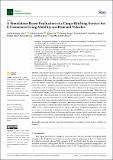A Simulation-Based Evaluation of a Cargo-Hitching Service for E-Commerce Using Mobility-on-Demand Vehicles
Author(s)
Romano Alho, André; Sakai, Takanori; Oh, Simon; Cheng, Cheng; Seshadri, Ravi; Chong, Wen Han; Hara, Yusuke; Caravias, Julia; Cheah, Lynette; Ben-Akiva, Moshe; ... Show more Show less
Downloadfuturetransp-01-00034.pdf (1.691Mb)
Publisher with Creative Commons License
Publisher with Creative Commons License
Creative Commons Attribution
Terms of use
Metadata
Show full item recordAbstract
Time-sensitive parcel deliveries—shipments requested for delivery in a day or less—are an increasingly important aspect of urban logistics. It is challenging to deal with these deliveries from a carrier perspective. These require additional planning constraints, preventing the efficient consolidation of deliveries that is possible when demand is well known in advance. Furthermore, such time-sensitive deliveries are requested to a wider spatial scope than retail centers, including homes and offices. Therefore, an increase in such deliveries is considered to exacerbate negative externalities, such as congestion and emissions. One of the solutions is to leverage spare capacity in passenger transport modes. This concept is often denominated as cargo hitching. While there are various system designs, it is crucial that such a solution does not deteriorate the quality of service of passenger trips. This research aims to evaluate the use of mobility-on-demand (MOD) services that perform same-day parcel deliveries. To test the MOD-based solutions, we utilize a high-resolution agent- and activity-based simulation platform of passenger and freight flows. E-commerce demand carrier data collected in Singapore are used to characterize simulated parcel delivery demand. We explore operational scenarios that aim to minimize the adverse effects of fulfilling deliveries with MOD service vehicles on passenger flows. Adverse effects are measured in fulfillment, wait, and travel times. A case study on Singapore indicates that the MOD services have potential to fulfill a considerable amount of parcel deliveries and decrease freight vehicle traffic and total vehicle kilometers travelled without compromising the quality of MOD for passenger travel. Insights into the operational performance of the cargo-hitching service are also provided.
Date issued
2021-11-03Department
Massachusetts Institute of Technology. Intelligent Transportation Systems LaboratoryPublisher
Multidisciplinary Digital Publishing Institute
Citation
Future Transportation 1 (3): 639-656 (2021)
Version: Final published version